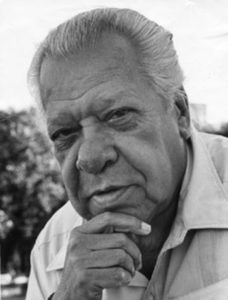
Nicolas Guillen
Nicolas Guillén was born on this date in 1902. He was an Afro Cuban poet, writer, journalist, and social activist.
From Camagüey, Cuba, he was the sixth child of Argelia Batista y Arrieta and Nicolás Guillén y Urra, both of whom were of mixed African and Spanish descent. Guillén’s journalist father introduced him to Afro Cuban music when he was young. The Cuban government assassinated his father. As Nicolas and his brothers and sister finished school in pre-revolutionary Cuba, they encountered the same racism that Black Americans lived with before the 1950s.
Guillén began writing about the social problems faced by African Americans in the 1920s. His first poems appeared in Camagüey Grafico in 1922, followed by his first collection of poems, "Cerebro y Corazon" (Brain and Heart). In 1926, he regularly contributed to the Sunday literary supplement of Havana’s Diario de la Marina. In 1929, he published "El Camino en Harlem," an article that condemned Cuba’s racial structures. During the same year, Guillén interviewed Langston Hughes in Havana, whom he deeply admired, and they became lifelong friends.
In 1930, he created an international stir with the publication of "Motivios de son," eight short poems inspired by the Son, a popular Afro Cuban musical form, and the daily living conditions of Cuban Blacks. Composed in Afro Cuban vernacular, the collection distinguished itself from the Spanish literary canon and established Black culture as a legitimate focus of Cuban literature. It was as if Guillén had touched on something that the people of Cuba could recognize as having been on the tips of their tongues, waiting for Guillén to articulate. Like Hughes, he believed that the Black artist must be free to “express our individual dark-skinned selves without shame.”
Guillén was as much a political activist as a poet. In 1937, he traveled to Spain as a delegate to the Second International Congress of Writers for the Defense of Culture. In an address before Congress, he condemned fascism and reaffirmed his Black roots. In 1940, he ran for mayor of Camagüey, and in 1948, Guillén was a senatorial candidate for the Cuban Communist Party; both campaigns were unsuccessful. His identification with the plight of blacks beyond his native Cuba is reflected in his "Elegias" (1958). Upon his return to Cuba in 1959, Fidel Castro assigned him the task of designing a new cultural policy and establishing the Union of Writers and Artists of Cuba, of which Guillén became president in 1961.
During the next two decades, he wrote and published several collections of poetry, including "Tengo" (1964), "El gran Zoo" (1967), "La Rueda Dentada," and "El Diario que a Diario" (1972), and "Sol de Domingo" (1982). Nicolas Guillén died in Havana in 1987.